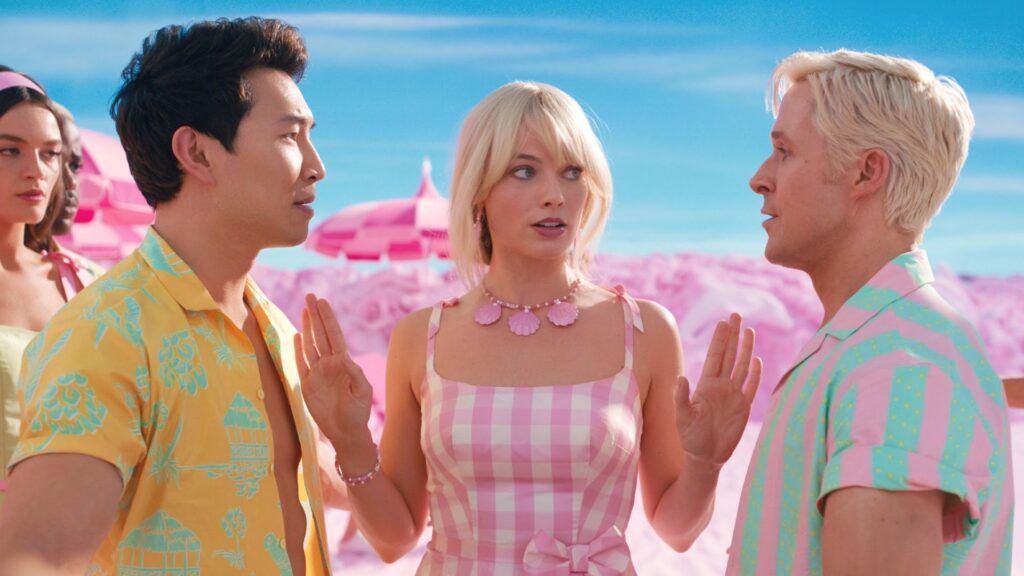
Greta Gerwig likes a challenge. After her smashing debut of Lady Bird, which revitalized the hoary coming-of-age picture (and which this critic deemed one of the best movies of the prior decade), she pivoted to Little Women, a story that’s been adapted so many times, it was hard to imagine anyone breathing new life into it. Yet by leveraging her own ingenuity and craft (not to mention Saoirse Ronan’s eyes), she succeeded, transforming a well-trod literary classic into an urgently modern depiction of female fraternity. Now she turns to Barbie, which presents an even greater adaptive difficulty. After all, here is a live-action summer blockbuster that is based—as its cheeky, 2001-referencing cold open freely acknowledges—on a fucking doll.
Barbie is my least favorite of Gerwig’s three features as a (solo) director to date. But to judge her latest effort purely against the magnificence of her prior accomplishments would be, to quote a blond icon from a different generation, way harsh. If she hasn’t maintained her own level of excellence, she has nevertheless demolished any reasonable set of expectations for what a Mattel-inspired movie could be. Barbie is a fleet and entertaining romp—a gorgeously designed film that buzzes with energy and wit, even as it also makes room for some genuine ideas.
First and foremost, it is further confirmation of Gerwig’s visual artistry. It might sound easy to just “pinkify” everything, but Barbieland, the fictional realm where most of the action takes place, is more than just a candy-colored theme park. It is both meticulously organized and airily liberated—a construction of painstaking artifice that nonetheless breathes with its own sense of life. The opening sequence in which Barbie (Margot Robbie) goes about her daily routine—slipping out of her sparkling heels on her way to a waterless shower (note that her feet never relinquish their 45-degree arch), flipping a pair of eggs onto a plate, waving in perfect harmony to her compatriots (all named Barbie, of course)—hums with perky precision. If playing with dolls were this fun in real life, I’d buy them myself.
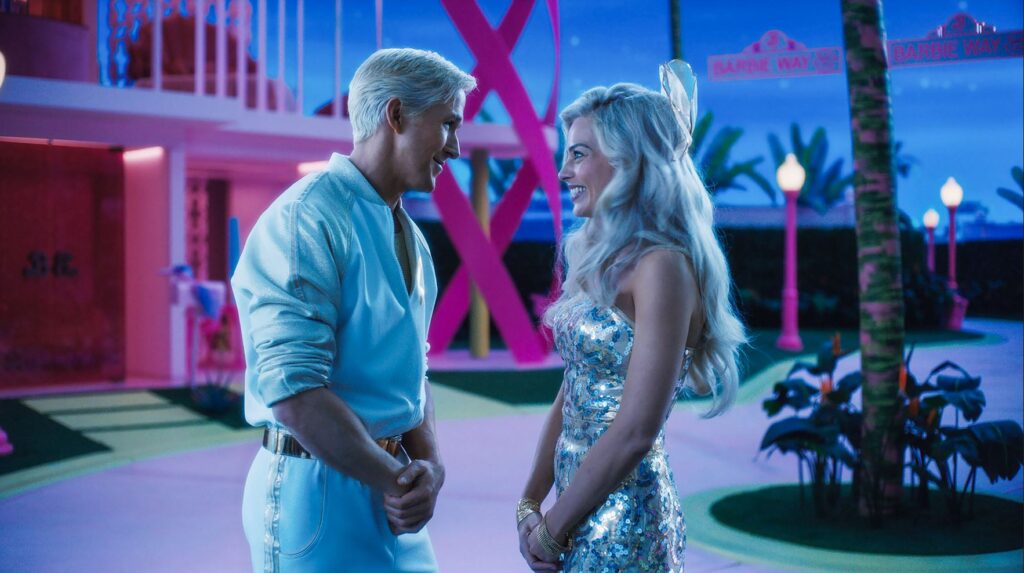
Which is both the point of Barbie and the source of its underlying tension. Gerwig, who wrote the screenplay with Noah Baumbach, is well aware that she’s making a movie based on a children’s product; Mattel may have graciously handed her $145 million and given her substantial creative freedom, but you can be damn sure it still plans to leverage the film’s financial success and sell a fuck-ton of dolls. She thus attempts to pay proper tribute to Barbie mythology—the hair, the car, the dream house—while simultaneously interrogating the source of its girlish appeal and the consequences of its market supremacy. It’s not for nothing that Robbie’s beaming heroine, with her golden locks and alabaster skin, is explicitly labeled “Stereotypical Barbie.”
Barbieland, in point of fact, is something of a feminist utopia. Its positions of political and capital power are all held by women, while the men—most of whom are named Ken, and who spend their days preening on the beach—function as eye candy and ornaments. (In the words of the film’s wildly successful marketing blitz: She’s everything, he’s just Ken.) This chromosomal disparity operates, quite pointedly, as an inversion from the real world—a truth Barbie encounters to her horror once circumstances force her to leave her homeland and travel, via both land and sea (in a snazzy sequence featuring vivid 2-D backdrops), to the dystopian hellscape that is Los Angeles.
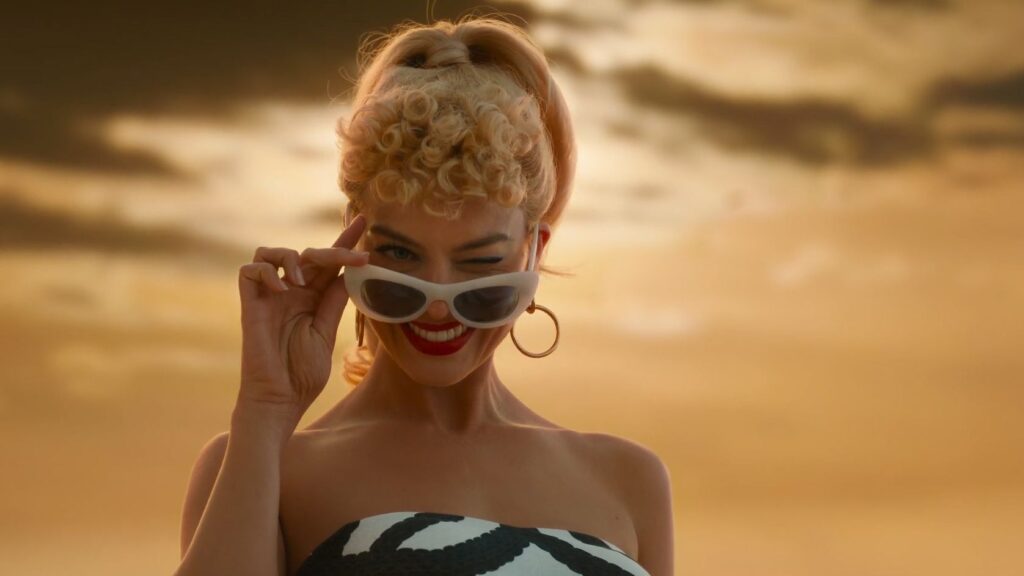
“I can’t find the word for it,” she falters as California bros ogle her while she rollerblades through Venice Beach. “It’s like I’m conscious, but of myself.” That’s funny! It is also one of many blunt observations that Gerwig supplies as she constructs a frank argument regarding body image, societal expectations, and gender roles. In the subgenre of toyetic cinema (The LEGO Movie is its closest companion), Barbie undoubtedly shatters the record for the number of times characters utter the word “patriarchy.”
Not all of this is handled with finesse. When Barbie spies a billboard showing contestants in the Miss America pageant and mistakes it for the membership of the Supreme Court, it’s clever as well as insightful. But when a secondary figure (played by America Ferrera) makes a Big Speech about the impossibility of womanhood, its thoughtfulness threatens to be drowned out by its didacticism. That said, it’s gratifying to watch a studio-supported, female-oriented, product-line-induced movie that possesses any ideology beyond the commercial imperative, “Peddle more toys.” That Gerwig’s unapologetic jabs toward male-dominated culture have triggered countless right-wing nitwits into issuing sweaty condemnations of the film’s purported “wokeness” is surely a sign she’s doing something right.
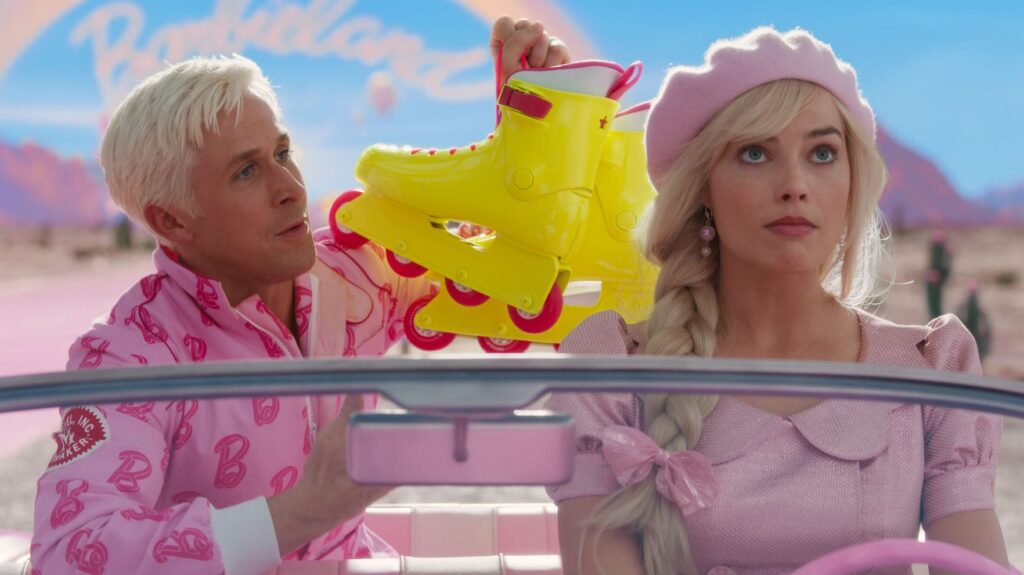
As a pure crowd-pleaser, Barbie is alternatively dazzling and uncertain. When it comes to aesthetics, it’s a triumph; Jacqueline Durran’s costumes sing with color and flair, while Sarah Greenwood’s production design creates a charming fantastical domain that mingles innovation with simplicity, widening our eyes yet never overwhelming us. (Both artisans are regular collaborators with Joe Wright, proof that Gerwig is happy to recruit from the best.) But while Gerwig delivers a few delightful song-and-dance numbers, she also attempts to amp things up with several quasi-action scenes—a chase through a maze of cubicles, a competition on a beach—that struggle to develop momentum or earn laughs. The movie’s comedy quotient on the whole is uneven; there are plenty of solid jokes and witty sight gags, but there are also childish double entendres (the phrase “beach you off” isn’t as amusing as Gerwig seems to think) and bouts of awkwardness. Most of the latter derive from Will Ferrell, who plays Mattel’s CEO and who seems to have improvised 80% of his dialogue; his credentials as an anarchic comedian are unimpeachable, but his manic whimsy proves a poor fit in Gerwig’s crisply calibrated universe.
The actor who proves a perfect fit, in contrast, is Ryan Gosling. He plays “Beach Ken,” a finely sculpted dimwit—as distinct from all the other finely sculpted dimwits named Ken (portrayed by various beefcakes including Simu Liu, Kingsley Ben-Adir, and John Cena)—who opens the movie as Barbie’s overeager suitor, attaches himself as her loyal (if not necessarily desired) companion, and gradually becomes her sociopolitical rival. Where Barbie perceives our reality as a place of sexualized hostility and incipient violence, Ken views it as a remarkable opportunity to reverse the only gender binary he’s ever known; when a woman casually calls him “sir” while asking for the time, he responds with amazement, “You respect me.” The look of newfound awe on Gosling’s face in that moment powers the film’s comic engine, even as it also signals a significant shift in narrative trajectory.
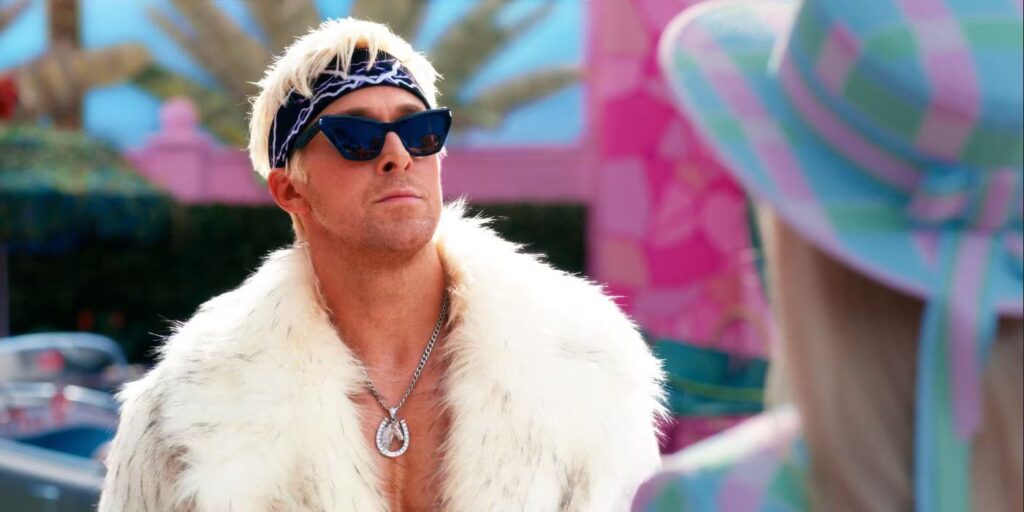
I don’t wish to spoil anything (is it possible to spoil a Barbie flick?), but the third act of Barbie is faintly ingenious—a bizarre hybrid of music-video blowout, con-man thriller, and action movie. It features what amounts to a heist plot involving a constitutional referendum, along with a hysterical mansplaining montage that will speak to a certain demographic of its audience with unnerving accuracy. (I was laughing until a character clarified that “CD stands for certificate of deposit,” at which point I crawled under my seat.) It also reinforces Gosling’s loose-limbed dexterity. Not since his career-best turn in The Nice Guys has the actor been so winningly stupid, whether he’s casually exposing his bicep, enthusing about his new mansion (“It’s the mojo dojo casa house”), or regaling his faux beloved with the glories of Matchbox Twenty (“I’ll play guitar at you”).
It is this majestic buffoonery that best exemplifies Gerwig’s true commitment to gender equality. For all the vitality of her women’s-lib message, she has generously allowed a man to steal every scene he’s in. Margot Robbie may indeed be the perfectly stereotypical Barbie. But it is Gosling’s Ken who is everything.
Grade: B+
Jeremy Beck is the editor-in-chief of MovieManifesto. He watches more movies and television than he probably should.

Have you reviewed Leave No Trace?
I have indeed! https://moviemanifesto.com/2018/07/leave-no-trace-out-of-woods-but-no.html